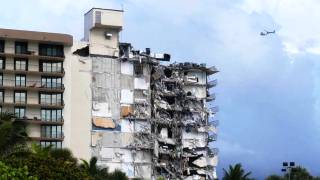To fix or not to fix. That is the question that too many Florida condominium residents and board members ask themselves. Like Shakespeare’s Hamlet, they are caught in an existential crisis.
|
The collapse of a condominium building in Surfside in June has spurred a new focus on how condo associations propel or delay maintenance. |
If adopted by the
state Legislature, the new rules will remove much of an
individual condominium association’s ability to “kick the
can down the road” when it comes to maintaining a building’s
structural integrity and life-safety features.
The task force’s proposals would require association board
members to complete maintenance, repair and replacement of
structural and life-safety systems in a “timely” manner,
largely without the need for a unit-owner vote. Further, the
amendments seek to give a condominium board the authority to
adopt special assessments or borrow money on behalf of the
association to fund necessary maintenance, also without a
unit-owner vote.
The task force recommends more frequent inspections, carried
out in a uniform, prescribed format by qualified engineers
and architects. For transparency’s sake, those inspection
reports must be made readily available to all unit owners
via the association’s website.
Perhaps most important of all, the task force recommends
that associations be obligated to perform future maintenance
cost studies and hold financial reserves or establish
borrowing capacity equal to at least 50% of the expected
repair and replacement costs.
Recognizing that these financial requirements could put a
significant burden on unit owners with fixed incomes or
limited financial resources, the task force also recommends
creating special, low-cost financing programs for those who
qualify.
All of this makes good sense. Detractors, however, worry
that the new regulations will drive up the cost of
condominium living, putting a strain on Florida’s retirees
and others on a fixed income.
But will it? Deferred maintenance usually ends up costing
more in the long run, as minor fixes deteriorate into
complete replacements. At a condominium, that means low
monthly maintenance fees today turn into tomorrow’s special
assessments, which can often run into the tens of thousands
of dollars per unit, or even more.
Deferred maintenance also depresses a condominium resident’s
property value. A group of real-estate agents recently told
the Miami Herald that condominium buyers won’t even consider
an older building that hasn’t passed — or is in the middle
repairs related to — its 40-year recertification.
Therefore, proper maintenance is a fiscally sound choice. It
saves money in the long run. It preserves property values.
And it eliminates risk. Encourage the Florida Legislature to
do the right thing by emailing your representative.
If we’re lucky, “to fix or not to fix” no longer will be the
existential question tearing condominium communities apart.
